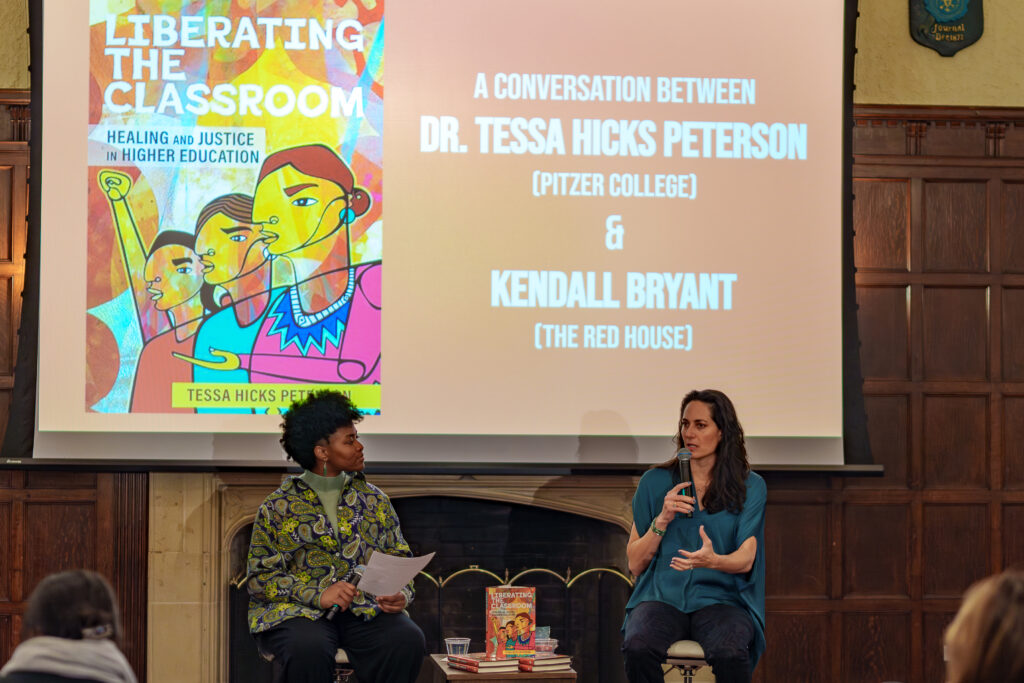Red House Hosts Liberating the Classroom Book Talk

On Friday, January 24th, the Red House hosted Dr. Tessa Hicks Peterson to discuss her new book, Liberating the Classroom: Healing and Justice in Higher Education. Dr. Hicks Peterson was in conversation with Kendall Bryant, Research and Writing Associate at the Red House. Red House director Randy Bass introduced the talk, citing Liberating the Classroom as an important text for cultivating wellbeing in higher education. He connected Dr. Hicks Peterson’s work to that of the Red House, which has worked to ground its pursuit of educational transformation in wellbeing practices; in September 2024, Red House hosted “A Journey Beyond Repair: Transforming Cycles of Harm into Healing,” a one-day workshop centered on the connection between trauma-informed practices that support inner wellbeing and outer social change.
Liberating the Classroom explores how universities can transform into places that directly disrupt injustice and work toward personal and collective liberation. Hicks Peterson examines innovative models, practices, and theories that students, teachers, and administrators can apply to implement both personal and systemic change. This book represents a major contribution in placing the claims of social justice, personal and social healing, and holistic pedagogy in a dialogue that is at once passionate and deeply considered. Peterson presents a vision of teaching and learning in which these three claims are mutually transformative.
In discussing the importance of this book, Dr. Hicks Peterson said that although it was especially pertinent to the current political climate, the book would always be timely, as legacies of healing and wellbeing have always existed in the face of injustice.
“If we don’t have radical imagination about the world that could exist, it’s going to be very hard to get there,” she said.
Dr. Hicks Peterson called on higher education institutions to recognize both the systemic roots of trauma and the underlying individual pathologies, and how they each show up in the classroom. She emphasized the importance of meeting students’ basic needs, and understanding how students are being impaired when their needs are not being met.
Dr. Hicks Peterson practices healing justice in higher education through her Inside-Outside Prison Exchange courses, which bring together undergraduate students and incarcerated college students over topics of community studies, healing justice, and social change. Dr. Peterson found that these classes created space for “hard conversations” and encouraged talking across differences.
In reflecting on her own positionality—both in the context of the prison exchange courses and her work in general—Dr. Hicks Peterson asked, “Who am I not to take responsibility for my privilege and do this work? If I’m going to be complicit in these systems, then I have to be complicit in their undoing.”
To end the talk, Dr. Hicks Peterson named her vision of justice: feeling seen, loved on, valued, and held accountable, and called on participants to imagine and pursue their own visions of justice.
–
Tessa Hicks Peterson is a scholar activist, teacher, facilitator, mother, wife, daughter, dancer, and community-builder. She is the Assistant Vice President of Community Engagement and Professor of Urban Studies at Pitzer College and directs a community-based research center there called CASA (Critical Action + Social Advocacy). Prior to joining academia, Tessa worked with community-based organizations throughout Los Angeles on human relations, anti-bias education and civil rights issues. She has a Masters and PhD in Cultural Studies from Claremont Graduate University and a BA in Psychology and Spanish from UC Santa Cruz. Tessa teaches classes and facilitates trainings on issues ranging from anti-bias education and social justice to empowerment through movement, mindfulness, and art. Her scholarship centers on transformative movement organizing and healing justice, community-based education and research, decolonization and indigenous knowledge, and prison education and abolition. Tessa’s ultimate work in the world is to engage with, teach about, learn from and better connect healing, arts, education, and justice.



